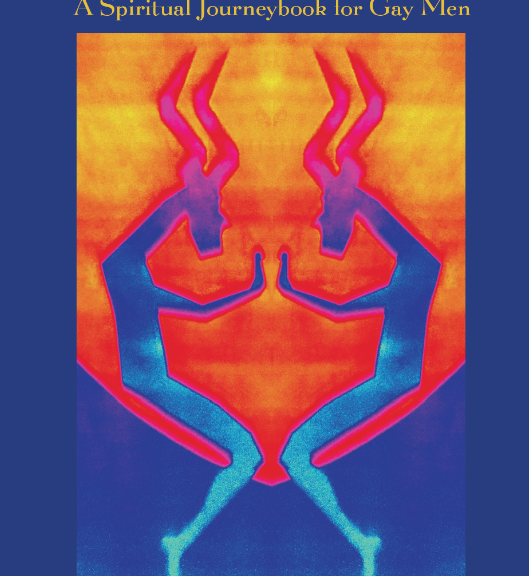ELI ANDREW RAMER, author and former White Crane columnist (“Praxis“) is a magid, a traditional Jewish religious itinerant preacher, skilled as a narrator of Torah and religious stories. He is the author of the classic Two FlutesPlaying. Now he has authored a companion to that seminal work, TwoHeartsDancing. Eli and I had a brief conversation about it:
Bo: So …what prompted you to write a “companion” to Two Flutes Playing?
Eli: I never planned to write a companion volume to “Two Flutes Playing.” Then again, I did, but life derailed/erased it – for almost 20 years. “Two Flutes Playing” is a channeled book that I compiled in the 1980s. First published by Joseph Kramer from the Body Electric School in 1991, it’s gone on to be reissued several times by different presses, including White Crane, and has had its own interesting life wandering around the world of gay men’s spirituality.
Around the time it was first published I wrote a story that led to another story that was beginning to become a book illustrated by my dear friend and Gay Spirit Visions Conference co-founder Raven Wolfdancer. When he was murdered I put together the drawings and stories we’d created into a small desktop published book, and when I sold the last copy I more or less forgot about it.
Flash forward. Covid arrives. A strange echo of our lives with AIDS. Locked away from the world I went through and organized all my unpublished work, came upon the stories I did with Raven, and sent them to the publisher who had reissued “Two Flutes Playing” – Wipf and Stock. They said it was too short. I started going through unpublished poems, added them to the old stories – and “Two Hearts Dancing” was born.
Bo: So while Two Flutes Playing was channeled, this is more of a collection of your thoughts in isolation?
Eli: What’s channeling? What’s inspiration? Who are our muses? Certainly Johnny Moses was a muse, some hours before we met, awakening one of the stories in the first part of the book. And Raven Wolfdancer was clearly a muse, embodied, in addition to creating the art that graces the first part. And the poems in the second part were inspired by lovers and strangers and other writing, so while not channeled in quite the same way as Two Flutes Playing, this new book is also a received text.
Bo: And do you think Two Hearts Dancing is a revival of that companion to Two Flutes? Or is something altogether new?
Eli: I call it a companion volume and not a sequel, but now that it’s been birthed, I do see the two books as siblings, the two of them dancing in and around each other, in and out of time.
Bo: Can you talk a bit about the role of story-telling in the LGBTQ community? And how you see it relating to the prophetic tradition?
Eli: A story is a line of thread linking two worlds together. A story is a line of saliva linking two kissers together. A story in our community is connector, a delight, and a tool for survival in an often-hostile world. We often find ourselves in words and stories in ways that we might not otherwise, in hearing a word for the first time and thinking – “Oh, that’s me!” A word, a new pronoun – worlds rippling out from words in wet delicious ways.
Stories began when we learned how to talk. This is a story. The first human language was manual and not verbal. It was signed and not spoken. We invited speech so that we could keep telling stories when it was dark. And then we invented fire. I believe – this is a story – that the very first storytellers were people like us, wandering in between female and male, the living and the dead, between words and silence. I believe that the first elders and prophets were people like us, living between female and male, the living and the dead, between words and silence, and able to link them all together, as with thread, as with the wet space between two people kissing, when they pull apart.
Bo: What are you reading these days?
Eli: Covid and the death of 40 people in my life since July 2017 altered my brain. I can hardly read or watch movies or take in much of anything, but I do thrive on going for four-hour walks. I used to read a book a week, usually three or four at the same time, one by my bed, one on the kitchen table, one next to the toilet, and one in my backpack for when I go out. Now it takes me more than a month to finish a book. What I’m reading, slowly – A Time to Mourn, a Time to Comfort: A Guide to Jewish Bereavement by Ron Wolfson, and The Lying Life of Adults by Elena Ferrante.
Bo: Could you describe Two Hearts Dancing for readers?
Eli. The book isn’t a coming out guide so much as it is a guidebook on coming in—coming in to who we are as mystics, lovers and healers. The first section has fourteen tales that are grounded in gay archetypes and ends with a responsive reading to be used in gay men’s rituals. The second part, Poems of Our Tribe is comprised of twenty-four poems that are mythic, mystical explorations of embodied spirituality, sexuality, and love.
